高一英语必修三知识点总结
- 格式:doc
- 大小:48.00 KB
- 文档页数:8
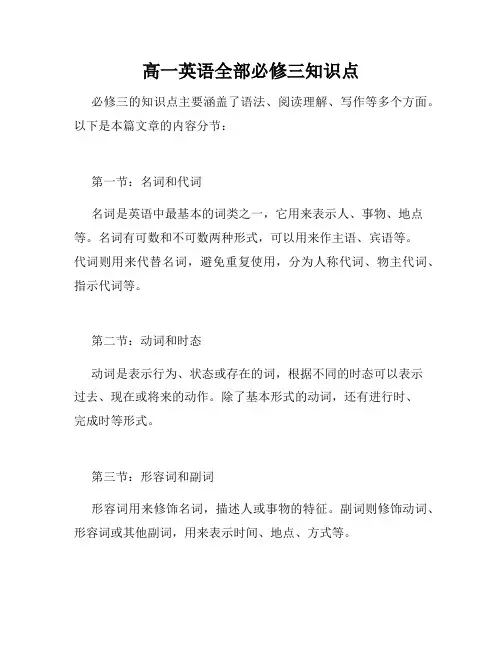
高一英语全部必修三知识点
必修三的知识点主要涵盖了语法、阅读理解、写作等多个方面。
以下是本篇文章的内容分节:
第一节:名词和代词
名词是英语中最基本的词类之一,它用来表示人、事物、地点等。
名词有可数和不可数两种形式,可以用来作主语、宾语等。
代词则用来代替名词,避免重复使用,分为人称代词、物主代词、指示代词等。
第二节:动词和时态
动词是表示行为、状态或存在的词,根据不同的时态可以表示
过去、现在或将来的动作。
除了基本形式的动词,还有进行时、
完成时等形式。
第三节:形容词和副词
形容词用来修饰名词,描述人或事物的特征。
副词则修饰动词、形容词或其他副词,用来表示时间、地点、方式等。
第四节:介词和连词
介词用于引导名词或代词与其他词之间的关系,表达位置、时间、方式等。
连词则用来连接句子或句子的部分,起到衔接的作用。
第五节:从句和复合句
从句是一个句子中的一部分,由连词引导,可以在句子中作主语、宾语或其他成分。
复合句由一个主句和一个或多个从句组成,句子结构更加复杂。
第六节:阅读理解和写作
阅读理解是对文章进行理解和分析,包括理解主旨、推理、推
断等。
写作则是用英语进行表达的能力,需要掌握句子结构、词
汇运用、语法规则等。
总结:
必修三的知识点涵盖了英语的基础语法、阅读理解和写作技巧。
掌握这些知识点对于学习英语、提高英语水平至关重要。
通过系
统地学习和实践,我们可以逐渐提升自己的英语能力,并在日常
生活和学习中灵活运用。
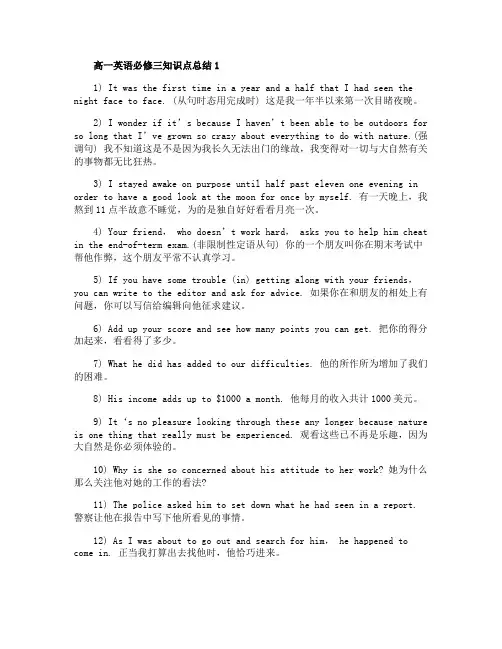
高一英语必修三知识点总结11) It was the first time in a year and a half that I had seen the night face to face. (从句时态用完成时) 这是我一年半以来第一次目睹夜晚。
2) I wonder if it’s because I haven’t been able to be outdoors for so long that I’ve grown so crazy about everything to do with nature.(强调句) 我不知道这是不是因为我长久无法出门的缘故,我变得对一切与大自然有关的事物都无比狂热。
3) I stayed awake on purpose until half past eleven one evening in order to have a good look at the moon for once by myself. 有一天晚上,我熬到11点半故意不睡觉,为的是独自好好看看月亮一次。
4) Your friend,who doesn’t work hard, asks you to help him cheat in the end-of-term exam.(非限制性定语从句) 你的一个朋友叫你在期末考试中帮他作弊,这个朋友平常不认真学习。
5) If you have some trouble (in) getting along with your friends,you can write to the editor and ask for advice. 如果你在和朋友的相处上有问题,你可以写信给编辑向他征求建议。
6) Add up your score and see how many points you can get. 把你的得分加起来,看看得了多少。
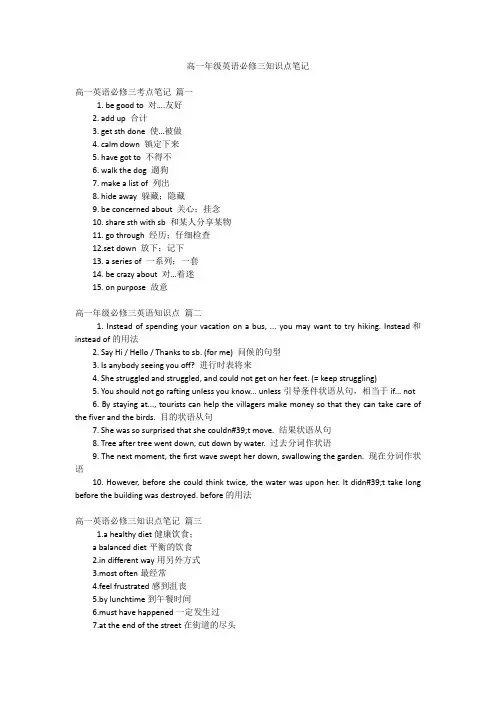
高一年级英语必修三知识点笔记高一英语必修三考点笔记篇一1. be good to 对….友好2. add up 合计3. get sth done 使…被做4. calm down 镇定下来5. have got to 不得不6. walk the dog 遛狗7. make a list of 列出8. hide away 躲藏;隐藏9. be concerned about 关心;挂念10. share sth with sb 和某人分享某物11. go through 经历;仔细检查12.set down 放下;记下13. a series of 一系列;一套14. be crazy about 对…着迷15. on purpose 故意高一年级必修三英语知识点篇二1. Instead of spending your vacation on a bus, ... you may want to try hiking. Instead和instead of的用法2. Say Hi / Hello / Thanks to sb. (for me) 问候的句型3. Is anybody seeing you off? 进行时表将来4. She struggled and struggled, and could not get on her feet. (= keep struggling)5. You should not go rafting unless you know... unless引导条件状语从句,相当于if... not6. By staying at..., tourists can help the villagers make money so that they can take care of the fiver and the birds. 目的状语从句7. She was so surprised that she couldn#39;t move. 结果状语从句8. Tree after tree went down, cut down by water. 过去分词作状语9. The next moment, the first wave swept her down, swallowing the garden. 现在分词作状语10. However, before she could think twice, the water was upon her. It didn#39;t take long before the building was destroyed. before的用法高一英语必修三知识点笔记篇三1.a healthy diet健康饮食;a balanced diet平衡的饮食2.in different way用另外方式3.most often最经常4.feel frustrated感到沮丧5.by lunchtime到午餐时间6.must have happened一定发生过7.at the end of the street在街道的尽头8.be tired of 厌倦9.be amazed at sth. 对。
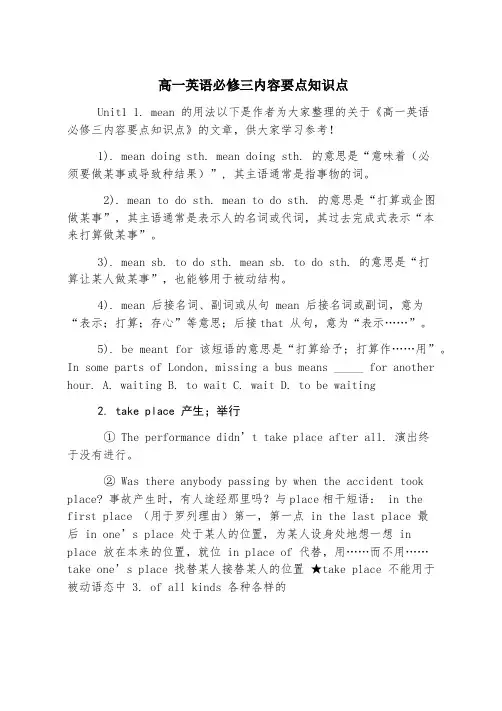
高一英语必修三内容要点知识点Unit1 1. mean 的用法以下是作者为大家整理的关于《高一英语必修三内容要点知识点》的文章,供大家学习参考!1). mean doing sth. mean doing sth. 的意思是“意味着(必须要做某事或导致种结果)”, 其主语通常是指事物的词。
2). mean to do sth. mean to do sth. 的意思是“打算或企图做某事”,其主语通常是表示人的名词或代词,其过去完成式表示“本来打算做某事”。
3). mean sb. to do sth. mean sb. to do sth. 的意思是“打算让某人做某事”,也能够用于被动结构。
4). mean 后接名词、副词或从句 mean 后接名词或副词,意为“表示;打算;存心”等意思;后接that 从句,意为“表示……”。
5). be meant for 该短语的意思是“打算给予;打算作……用”。
In some parts of London, missing a bus means _____ for another hour. A. waiting B. to wait C. wait D. to be waiting2. take place 产生;举行① The performance didn’t take place after all. 演出终于没有进行。
② Was there anybody passing by when the accident took place? 事故产生时,有人途经那里吗?与place相干短语: in the first place (用于罗列理由)第一,第一点 in the last place 最后in one’s place 处于某人的位置,为某人设身处地想一想 inplace 放在本来的位置,就位 in place of 代替,用……而不用…… take one’s place 找替某人接替某人的位置★take place 不能用于被动语态中 3. of all kinds 各种各样的【归纳】 all kinds of 各种各样的 the same kind of 相同种类的 different kinds of 不同种类的 this/that kind of 这(那)种 a kind of 某种 That kind of question is very difficultto answer.= Questions of that kind are difficult to answer. We sell all kinds of shoes.= We sell shoes of all kinds.③ You can see different kinds of animals in the zoo. = You can see animals of different kinds in the zoo. 你在动物园可以看见不同种类的动物。
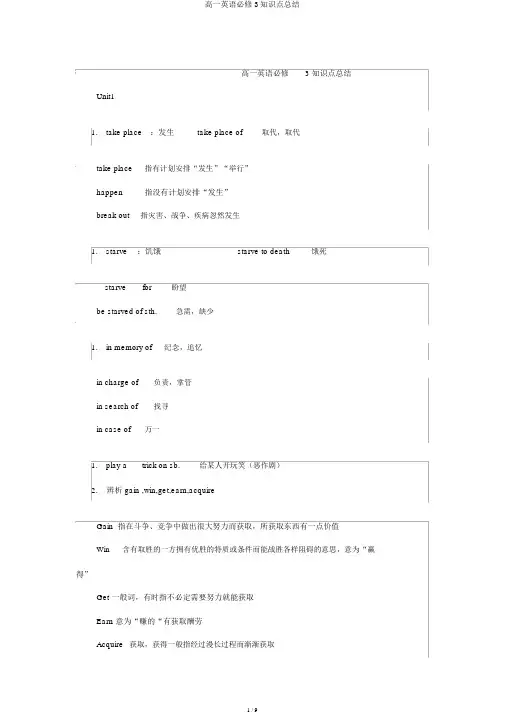
高一英语必修 3 知识点总结Unit11. take place:发生take place of取代,取代take place指有计划安排“发生”“举行”happen指没有计划安排“发生”break out指灾害、战争、疾病忽然发生1. starve:饥饿starve to death饿死starve for盼望be starved of sth.急需,缺少1. in memory of纪念,追忆in charge of负责,掌管in search of找寻in case of万一1. play a trick on sb.给某人开玩笑(恶作剧)2.辨析 gain ,win,get,earn,acquireGain 指在斗争、竞争中做出很大努力而获取,所获取东西有一点价值Win含有取胜的一方拥有优胜的特质或条件而能战胜各样阻碍的意思,意为“赢得”Get 一般词,有时指不必定需要努力就能获取Earn 意为“赚的“有获取酬劳Acquire获取,获得一般指经过漫长过程而渐渐获取1.gather 与 collectgather重申分别的东西齐集在一同collect对某物进行采集1.award,prize,rewardaward 奖赏,重申荣誉而不在意奖品的大小或奖金的多少prize指各种比赛、竞争或抽奖中博得的奖reward指对某人的工作或服务等的报恩(酬劳,赏金)1.admire: 敬佩, admire sb. for sth.2.look forward to期望,希望3.turn up 出现turn in上交turn out结果是1.keep one ’s word 守信誉2. apologize to sb. for doing/sth.向某人致歉3.set off出发,起程4. remind sb. of sth.使某人想起。
remind sb. to do sth.提示某人做某事1.while 用法(1)当。
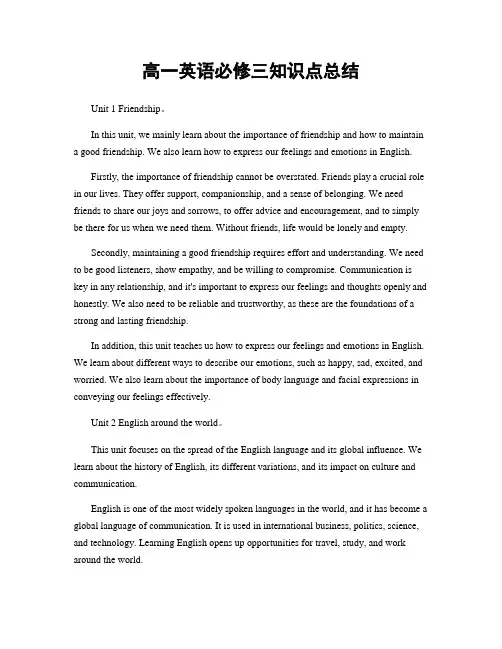
高一英语必修三知识点总结Unit 1 Friendship。
In this unit, we mainly learn about the importance of friendship and how to maintain a good friendship. We also learn how to express our feelings and emotions in English.Firstly, the importance of friendship cannot be overstated. Friends play a crucial role in our lives. They offer support, companionship, and a sense of belonging. We need friends to share our joys and sorrows, to offer advice and encouragement, and to simply be there for us when we need them. Without friends, life would be lonely and empty.Secondly, maintaining a good friendship requires effort and understanding. We need to be good listeners, show empathy, and be willing to compromise. Communication is key in any relationship, and it's important to express our feelings and thoughts openly and honestly. We also need to be reliable and trustworthy, as these are the foundations of a strong and lasting friendship.In addition, this unit teaches us how to express our feelings and emotions in English. We learn about different ways to describe our emotions, such as happy, sad, excited, and worried. We also learn about the importance of body language and facial expressions in conveying our feelings effectively.Unit 2 English around the world。
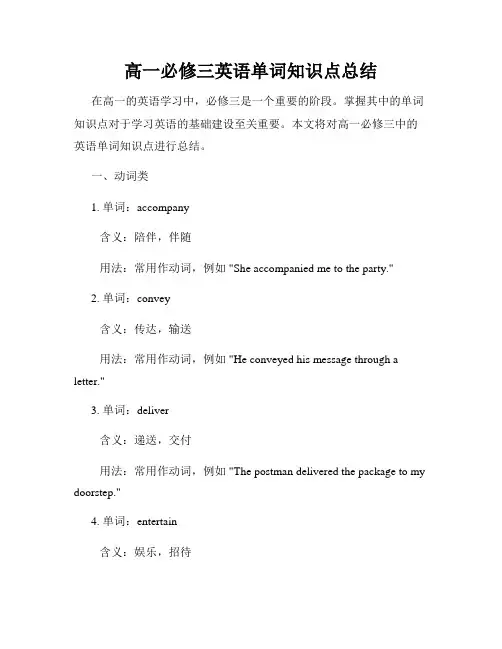
高一必修三英语单词知识点总结在高一的英语学习中,必修三是一个重要的阶段。
掌握其中的单词知识点对于学习英语的基础建设至关重要。
本文将对高一必修三中的英语单词知识点进行总结。
一、动词类1. 单词:accompany含义:陪伴,伴随用法:常用作动词,例如 "She accompanied me to the party."2. 单词:convey含义:传达,输送用法:常用作动词,例如 "He conveyed his message through a letter."3. 单词:deliver含义:递送,交付用法:常用作动词,例如 "The postman delivered the package to my doorstep."4. 单词:entertain含义:娱乐,招待用法:常用作动词,例如 "The singer entertained the audience with her beautiful voice."二、形容词类1. 单词:apparent含义:明显的,显然的用法:常用作形容词,例如 "Her happiness was apparent from her smile."2. 单词:comprehensive含义:全面的,综合的用法:常用作形容词,例如 "The book provides a comprehensive overview of the topic."3. 单词:delicate含义:精细的,纤细的用法:常用作形容词,例如 "She held the delicate flower in her hand."4. 单词:transparent含义:透明的,明显的用法:常用作形容词,例如 "The glass is transparent, allowing us to see through it."三、名词类1. 单词:abstract含义:摘要,概要用法:常用作名词,例如 "The report provided an abstract of the research findings."2. 单词:boundary含义:边界,界限用法:常用作名词,例如 "They marked the boundary between the two countries."3. 单词:circumstance含义:情况,环境用法:常用作名词,例如 "Under the circumstances, it is best to stay calm."4. 单词:equivalent含义:相等的,等价的用法:常用作名词,例如 "One euro is equivalent to 1.2 dollars."四、副词类1. 单词:consequently含义:因此,所以用法:常用作副词,例如 "She didn't study for the test and consequently, she failed."2. 单词:previously含义:之前,事先用法:常用作副词,例如 "He had previously visited Paris before."3. 单词:simultaneously含义:同时地用法:常用作副词,例如 "The two events happened simultaneously."4. 单词:implicitly含义:含蓄地,默认地用法:常用作副词,例如 "He implicitly agreed to my proposal."本文总结了高一必修三中的英语单词知识点,包括动词、形容词、名词和副词类。
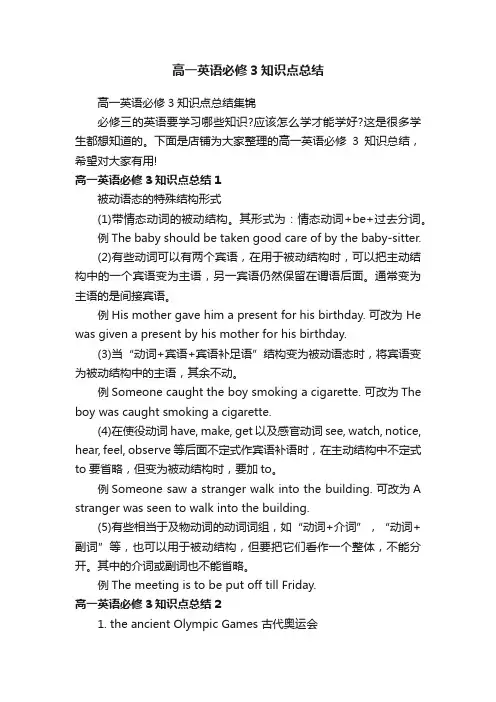
高一英语必修3知识点总结高一英语必修3知识点总结集锦必修三的英语要学习哪些知识?应该怎么学才能学好?这是很多学生都想知道的。
下面是店铺为大家整理的高一英语必修3知识总结,希望对大家有用!高一英语必修3知识点总结1被动语态的特殊结构形式(1)带情态动词的被动结构。
其形式为:情态动词+be+过去分词。
例The baby should be taken good care of by the baby-sitter.(2)有些动词可以有两个宾语,在用于被动结构时,可以把主动结构中的一个宾语变为主语,另一宾语仍然保留在谓语后面。
通常变为主语的是间接宾语。
例His mother gave him a present for his birthday. 可改为 He was given a present by his mother for his birthday.(3)当“动词+宾语+宾语补足语”结构变为被动语态时,将宾语变为被动结构中的主语,其余不动。
例Someone caught the boy smoking a cigarette. 可改为The boy was caught smoking a cigarette.(4)在使役动词have, make, get以及感官动词see, watch, notice, hear, feel, observe等后面不定式作宾语补语时,在主动结构中不定式to要省略,但变为被动结构时,要加to。
例Someone saw a stranger walk into the building. 可改为A stranger was seen to walk into the building.(5)有些相当于及物动词的动词词组,如“动词+介词”,“动词+副词”等,也可以用于被动结构,但要把它们看作一个整体,不能分开。
其中的介词或副词也不能省略。
例The meeting is to be put off till Friday.高一英语必修3知识点总结21. the ancient Olympic Games 古代奥运会2. compete in …compete with other countries for world market 与其它国家竞争国际市场 compete in a race 参加赛跑compete with [against] sb. for sth. 与某人竞争而获得某物Our Greek cities used to compete against each other just for the honour of winning.我们希腊各个城市之间曾经为了荣誉而彼此之间相互竞争。

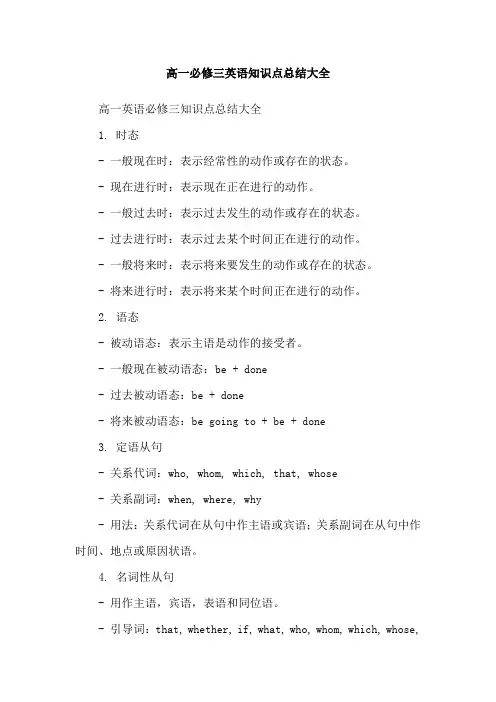
高一必修三英语知识点总结大全高一英语必修三知识点总结大全1. 时态- 一般现在时:表示经常性的动作或存在的状态。
- 现在进行时:表示现在正在进行的动作。
- 一般过去时:表示过去发生的动作或存在的状态。
- 过去进行时:表示过去某个时间正在进行的动作。
- 一般将来时:表示将来要发生的动作或存在的状态。
- 将来进行时:表示将来某个时间正在进行的动作。
2. 语态- 被动语态:表示主语是动作的接受者。
- 一般现在被动语态:be + done- 过去被动语态:be + done- 将来被动语态:be going to + be + done3. 定语从句- 关系代词:who, whom, which, that, whose- 关系副词:when, where, why- 用法:关系代词在从句中作主语或宾语;关系副词在从句中作时间、地点或原因状语。
4. 名词性从句- 用作主语,宾语,表语和同位语。
- 引导词:that, whether, if, what, who, whom, which, whose,when, where, why, how等。
5. 倒装句- 完全倒装:表示地点、时间或方向的副词位于句首时,主语和谓语动词要倒装。
- 部分倒装:只把助动词、情态动词或be动词放在主语之前。
6. 状语从句- 时间状语从句:when, while, as, before, after, by the time, as soon as, until, unless等。
- 地点状语从句:where- 原因状语从句:because, since, as, now that, due to, owing to等。
- 目的状语从句:so that, in order that- 结果状语从句:so that, so...that, such...that- 条件状语从句:if, unless, as long as, provided that, on condition that等。
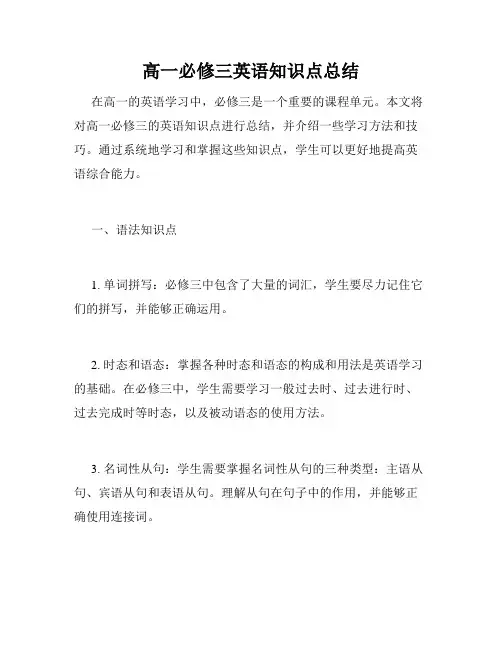
高一必修三英语知识点总结在高一的英语学习中,必修三是一个重要的课程单元。
本文将对高一必修三的英语知识点进行总结,并介绍一些学习方法和技巧。
通过系统地学习和掌握这些知识点,学生可以更好地提高英语综合能力。
一、语法知识点1. 单词拼写:必修三中包含了大量的词汇,学生要尽力记住它们的拼写,并能够正确运用。
2. 时态和语态:掌握各种时态和语态的构成和用法是英语学习的基础。
在必修三中,学生需要学习一般过去时、过去进行时、过去完成时等时态,以及被动语态的使用方法。
3. 名词性从句:学生需要掌握名词性从句的三种类型:主语从句、宾语从句和表语从句。
理解从句在句子中的作用,并能够正确使用连接词。
4. 倒装句:了解倒装句的构成和用法,包括完全倒装和部分倒装。
学生应注意倒装句的特殊情况和常见错误。
5. 非谓语动词:熟练掌握不定式、动名词和分词的构成和用法,特别是在句子中做主语、宾语、定语和状语的情况。
二、阅读理解技巧1. 预览:在阅读一篇文章之前,预览标题、副标题、图片和图表,获取文章的主题和大意。
2. 审题:在做阅读理解题时,仔细阅读问题和选项,确保自己理解正确。
3. 多种阅读方法:根据不同的题型,运用不同的阅读方法,如扫读、精读和略读。
同时,注意文章的结构和段落之间的关联。
4. 词汇猜测:通过上下文猜测生词的意思,避免频繁查字典,提高阅读速度和理解能力。
5. 注意细节:细致地阅读文章中的细节,特别是数字、地点、人物和事件等重要信息。
三、写作技巧和表达能力1. 提炼观点:学会将自己的观点或论据简洁明确地表达出来,并且结合具体事实和例子进行支撑。
2. 逻辑连贯:文章中的每个段落和句子应该有明确的逻辑关系,确保文章的结构和推理合理。
3. 词汇和句型丰富:运用丰富的词汇和多样的句型,使文章更加生动有趣。
4. 注意语法和拼写:写作过程中要注意语法错误和拼写错误的修正,这需要对语法知识和常用词汇的掌握。
5. 大量练习:通过大量的写作练习来提高写作能力,同时经常读英文文章和书籍来积累写作素材和表达方式。
高一英语必修三知识点归纳高一英语必修三学问点篇一1. While still a student, she played roles in many plays.连词+ 名词做时间状语2. When asked about the secret of his success, Steven Spielberg said 连词+过去分词做时间状语3. When drinking to someones health, you raise your glasses. 连词+ 此时此刻分词做时间状语4. Its a custom in China to have some tea before the meal is served. It 做形式主语5. Many people like this film not just because..., but alsobecause... 并列连词6. Having good table manners means knowing...动名词做主宾语高一英语必修三学问点篇二1. wear, put on, have on, dress, be in, try on(1) wear v. 穿着;戴;蓄须(发);磨损;(脸容)呈现,显出He is wearing an overcoat today.* wear out (把) 穿破;(把) 用坏;(使) 疲乏;(使) 耗尽I have worn out my shoes. / My patience wore (was worn) out.(2) put on 穿上;戴上(侧重穿着的动作)Put on your sweater, otherwise you will feel cold.(3) dress vt. 给穿衣服n. 衣服;连衣裙dress sb. (in sth.) 或be dressed (in sth.) 留意:穿的衣服接在in 之后。
高一英语必修3知识点总结高一是初高中的过渡时期,在高中的起始阶段对学生英语听力能力培养的重要性具有非凡的意义。
那么英语必修三的知识点你都掌握了多少了呢?接下来小编为你整理了高一英语必修3知识点,一起来看看吧。
高一英语必修3知识点 1. award /n./奖金,奖品,奖/vt./授予,判定win/receive/ get an awardaward sb. for sth.award sb. sth./ award sth. to sb.2. admire /vt./赞美,钦佩,羡慕admire sb. for sth.admiration /n./钦佩,欣赏have an admiration foradmiring /adj./赞赏的,羡慕的3. apologize /vi./道歉,辩白apologize sb. for (doing ) sth.apology /n./ 道歉make/ offer an apology to sb. for ( doing ) sth.= offer sb. an apology for (doing ) sth.accept /refuse an/ ones apology4. remind /vt./ 提醒,使想起remind sb. of / about sth.remind sb. to do sth. remind that......accuse sb. of (doing) sth.convince sb. of sth. cure sb. of.......inform sb. of sth. rid sb./ sth. of .........rob sb. of sth.5. forgive /vt./ (forgave, forgiven) 原谅,饶恕forgive sb. for ( doing ) sth. forgive ones doing sth. forgive sb. sth. forgive me6. in memory of 纪念,追念in praise of in honor ofin favor of in support ofin charge of in search ofin possession of in need of7. look forward to 期望,盼望,期待look down upon / on look intolook out look through look up to8. have fun with 玩得开心have fun = enjoy oneself for fun make fun of What fun! Its fun to do/ doing sth.9. turn up 出现,到场turn around /round turn down turn in turn out turn to sb.for help句型1. It was obvious that.....it 作形式主语的常用句式:1)It be + 形容词( possible, strange, natural, important,necessary.....) + that从句。
高一必修三英语unit3知识点高一必修三英语Unit 3 知识点本文将为您介绍高一必修三英语第三单元的知识点,帮助您更好地理解和掌握相关知识。
一、词汇与短语1. deliver v. 传送,递送例句:The postman delivered the package to my door this morning.2. tidy adj. 整洁的例句:Please keep your desk tidy and organized.3. faith n. 信任,信念例句:She has great faith in her abilities to succeed in life.4. launch v. 发起,推出例句:The company plans to launch a new product next month.5. consult v. 咨询,商议例句:You should consult your doctor before starting any new exercise routine.6. exclude v. 排除,不包括例句:The ticket price excludes drinks and snacks.7. accompany v. 陪同,伴随例句:I'll accompany you to the airport so that you won't get lost.8. focus n. 焦点,重点例句:The meeting's focus will be on the company's future expansion plans.9. transfer v. 转移,调动例句:He was transferred to the company's branch office in New York.10. obtain v. 获得,得到例句:You can obtain a copy of the report from the receptionist.二、语法知识1. 动词的时态和语态英语动词有多种时态和语态,如一般现在时、一般过去时、现在进行时、过去进行时、一般将来时、被动语态等。
高一英语必修3知识点总结高一英语必修3是高中英语教材中的一本必修课程,内容涉及语法、阅读理解、写作等多个方面。
在这本教材中,我们学习了很多重要的知识点,下面我将对其中一些重要的知识点进行总结。
一、语法知识点1. 形容词比较级和最高级形容词比较级和最高级用于比较两个或多个人或物之间的差异。
例如:Tina is taller than Tom.(蒂娜比汤姆更高)在比较级句型中,比较的对象通常是具体的人或物,根据不同的情况选择合适的比较级形式。
2. 定语从句定语从句用来修饰名词或代词,并且在句子中充当定语的角色。
例如:The book that I borrowed from the library is very interesting.(我从图书馆借的那本书非常有趣)在定语从句中,先行词(被修饰的名词或代词)和关系词(引导从句的词)之间存在一定的关系,需要根据这种关系选择合适的关系代词或关系副词。
3. 被动语态被动语态用于表示动作的接受者或受事者,而不是执行者或主体。
例如:The house was built by my grandfather.(这座房子是我祖父建的)在被动语态中,动词的主语变为动作的接受者,而动作的执行者变为介词短语或省略。
二、阅读理解高一英语必修3中的阅读理解部分主要涵盖了文章的理解、细节理解和推理判断等内容。
通过阅读不同类型的文章,我们可以提高我们的阅读能力和理解能力,同时也可以了解各种不同的文化和知识。
在阅读理解中,我们需要仔细阅读文章,并注意理解作者的意图和观点。
还需要掌握一些常用的阅读技巧,如扫读、略读、精读等,以便更好地理解文章的内容。
三、写作技巧高一英语必修3中的写作部分是培养我们的写作能力和表达能力的重要内容。
通过不同类型的写作练习,我们可以提高我们的写作水平,掌握合适的写作结构和表达方式。
在写作过程中,我们需要注意以下几点:1. 选择合适的话题和写作类型;2. 明确写作的目的和受众;3. 制作一个清晰的写作大纲,包括引言、正文和结论等部分;4. 使用适当的过渡词和连接词,使文章更加连贯;5. 关注语法和拼写错误,并进行适当的修改和润色。
高一英语必修三知识点梳理(经典版)编制人:__________________审核人:__________________审批人:__________________编制单位:__________________编制时间:____年____月____日序言下载提示:该文档是本店铺精心编制而成的,希望大家下载后,能够帮助大家解决实际问题。
文档下载后可定制修改,请根据实际需要进行调整和使用,谢谢!并且,本店铺为大家提供各种类型的经典范文,如工作报告、致辞讲话、条据书信、合同范本、规章制度、应急预案、心得体会、教学资料、作文大全、其他范文等等,想了解不同范文格式和写法,敬请关注!Download tips: This document is carefully compiled by this editor. I hope that after you download it, it can help you solve practical problems. The document can be customized and modified after downloading, please adjust and use it according to actual needs, thank you!Moreover, our store provides various types of classic sample essays, such as work reports, speeches, policy letters, contract templates, rules and regulations, emergency plans, insights, teaching materials, essay encyclopedias, and other sample essays. If you want to learn about different sample formats and writing methods, please pay attention!高一英语必修三知识点梳理学习虽然也包含有好工作,有素质,别人看的有文化这种成分,但目的绝对不能设为这些微不足道的微量元素,下面给大家分享一些关于高一英语必修三知识点梳理,希望对大家有所帮助。
高一英语必修三重点知识点高一英语必修三是高中英语教材的一部分,其中包括了许多重要的知识点。
本文将针对高一英语必修三的重点知识点进行介绍和总结,帮助同学们更好地掌握这些知识。
一、语法知识点1. 时态和语态高一英语必修三中,涉及到了一些常用的时态和语态,包括一般现在时、一般过去时、一般将来时、现在进行时、过去进行时等。
同学们需要掌握它们的基本用法以及相应的句式结构。
2. 从句和状语从句从句是句子中的一个句子成分,在高一英语必修三中,包括了名词性从句、定语从句和状语从句等。
需要注意的是,从句的引导词和语序要符合相应的规则。
3. 被动语态和主动语态被动语态在高一英语必修三中比较常见,需要了解被动语态的构成和用法。
同时,主动语态也是需要掌握的知识,了解主动语态和被动语态的转换。
二、词汇知识点1. 同义词和反义词在高一英语必修三中,经常会出现同义词和反义词,例如兴高采烈和沮丧、优点和缺点等。
通过了解和记忆这些词汇的用法,可以提升文章表达的准确性和丰富性。
2. 词根和词缀词根和词缀是构成单词的基本单位,通过了解常见的词根和词缀,可以帮助同学们更好地理解和记忆生词。
例如,tele-表示“远程”,telephone表示“电话”。
3. 固定搭配和习惯用语高一英语必修三中有很多固定搭配和习惯用语,例如take care of,make up等。
掌握这些固定搭配和习惯用语的用法,可以提高语言表达的地道性。
三、阅读理解知识点1. 阅读技巧阅读理解是高一英语必修三中的重点内容之一,需要学会运用一些阅读技巧来提高阅读效率和准确度。
例如,预测答案、寻找关键词等。
2. 主旨大意在阅读理解中,理解和把握文章的主旨大意非常重要。
同学们需要通过阅读来概括和总结文章的主要内容。
3. 推理判断阅读理解中有时需要通过推理来判断答案,同学们需要学会运用文字之外的信息和自己的逻辑推理来解答问题。
总结:高一英语必修三的重点知识点包括语法知识、词汇知识和阅读理解知识。
第一单元1. starvevt.&vi. (使)饿死;饥饿;渴望,急需;饿得要死She s starving herself trying to lose weight.她为了减肥而忍饥挨饿。
常用结构:starve for渴望得到……starve to death 饿死be starved of极需,缺乏starve sb. into sth./ doing sth.使某人挨饿以迫使其做某事The plants are starving for water.这些植物极需要水。
They got lost in the desert and starved to death.The engine was starved of petrol and wouldn’t start.starvation n. 挨饿;饿死2. belief n. \[C/U\] 信任;信仰,信心believe vi.&vt. 相信have belief in sth./sb. 对某物/某人的真实性和正确性所具有的信心beyond belief 难以置信in the belief that ... 相信……It is my belief that ...我相信……He has great belief in his doctor.他对他的医生无比信赖。
She has lost her belief in God.她已不相信上帝。
3. gainn. 获得;增加;获利,获得物;收益;利润vt. 得到;获得,赢得,增加,增添,到达;(钟、表等)快He gained full marks in the examination.他考试得了满分。
For the first time in her life she gained a clear idea of how vast the world is.The company has made notable gains in productivity.My watch gains five minutes a day.我的表一天快5分钟。
易混辨析gain/win/get/earn/acquiregain指在斗争,竞争中做出很大努力而“获得……”,所得到的东西常具有一定价值。
win含有取胜的一方具有优越的特质或条件而能克服各种障碍的意思,意为“赢得”。
get为普通词,有时指不一定需要努力就能“得到”。
earn意为“赚得”,表示经过艰苦努力所得到的报酬。
acquire意为“获得,取得”,一般指通过漫长的过程而逐渐获得。
4. awardvt. 授予,奖给(后多接双宾语,在多数场合下用被动形式be awarded);判定n.奖,奖品;奖金Medals were awarded to the best speakers on the debating team.He got the highest award in the contest.award/prize/rewardaward既可作动词也可作名词,指为鼓励在工作中达到或完成所提出的要求或条件的人而进行的奖励,往往强调荣誉而不在乎奖品的大小或奖金的多少。
prize为名词,多指在各类竞赛、竞争或抽彩中所赢得的奖。
这种奖赏有的凭能力获得,有的凭运气获得。
reward既可作动词也可作名词,指对某人的工作或服务等的报答。
也指因帮助警察抓到罪犯或帮助失主找到东西而得到的赏金、酬金。
He won the award for the best student of the year.A prize was given to the person who had the winning number.He received a medal as a reward for his courage.5. admire vt. 赞美;钦佩;羡慕。
其后可接人或物作宾语,但不可以接宾语从句作宾语。
admiration n. 赞美,钦佩;令人赞美的人或物admirer n. 钦佩者;羡慕者admire sb. for sth. 因某事钦佩或羡慕某人express admiration for sb. 对某人表示钦佩have great admiration for sb. 十分钦佩某人in admiration of 表示钦佩with/in admiration 心怀钦佩地They admired our garden.他们羡慕我们的花园。
I admire him for his success in business.Aren‘t you going to admire my new house?联想拓展warn sb. of sth.警告某人某事rob sb. of sth.抢劫某人某物rid sb. of sth.使某人摆脱/除去某物suspect sb. of sth.怀疑某人某事accuse sb. of sth. 控告某人某事demand answer of sb.要求某人答复ask a favour of sb.请某人帮忙6. remindvt. 提醒;使想起常用结构:remind sb. of/about sth. 提醒某人记住/想起某事remind sb. to do sth. 提醒某人做某事remind sb. that ...提醒某人/使某人想起……I reminded Gerald of his promise.我提醒吉罗德他曾许下的诺言。
Please remind me to write to my mother tomorrow.7. permission n. \[U\]许可,允许permit vt. 准许,许可,允许n. 许可(证);执照常用结构:with/without (one s) permission 得到允许/未经允许ask sb. for permission 征求某人的许可give sb. permission to do sth. 允许某人做某事have one s permission 得到某人的同意8. clothing n. (总称)衣服,服装\[U\]Check your belongings and make sure you don t leave your articles of clothing behind.Food, clothing and shelter are everyone‘s priorities.易错辨析clothing/clothes/clothclothing是衣服、被褥的总称,为不可数名词;clothes指包括上衣、裤子、内衣、外衣等在内的具体的衣服,它没有单数形式,只能说many/some/a few clothes; cloth则指做衣服所用的布料,为不可数名词。
选词填空(clothing/clothes/cloth)①The industry in this area has been going from strength to strength.②It’s cold outside. You’d better put on more .③How much does it take to make a blouse for a girl?答案:①clothing②clothes③cloth9. take place发生;举行In the meantime, an economic crisis took place in that country.The Olympic Games take place every four years.联想拓展take one s place=take the place of ...代替……take the first place 获得第一名in place of 代替take place/happen/break out/occurtake place 通常表示计划、安排之内的“发生”。
happen指事情偶然的发生,常带有未能预见的含义;另外,还有“碰巧”之意。
break out指火灾、战争或瘟疫的突然爆发。
occur指按计划发生,常指(某想法、某事)出现在某人的头脑中。
常见结构:It occurs/occurred to sb. that表示“某人想起某事”。
It occurred to me that I had forgotten my keys.10. in memory of=to the memory of 纪念;追念Many ceremonies are in memory of famous people.The statue was built in memory of the famous scientist.联想拓展in honour of 为了纪念……;向……表示敬意in praise of 歌颂;称赞in favour of 赞同, 支持in charge of 负责in need of 需要;缺少in search of 寻找in possession of 拥有11. dress updress作“打扮自己或打扮某人”讲,与介词as/like连用或用于dress up as sb./dress up for sth.结构。
We are supposed to dress up as movie characters for the party, what a novel idea!They dress up for the occasion.She dress up in Elizabethan costume for the fancy dress ball.联想拓展be dressed in 穿着……衣服be dressed as 打扮成be well dressed 衣着讲究dress oneself 穿衣,打扮dress sb. 给某人穿衣服高手过招搞恶作剧;诈骗;开玩笑The children played a trick on their teacher on April Fool’s Day.孩子们在愚人节那天捉弄了他们的老师。
Remember not to play any tricks on the disabled.记住不要戏弄残疾人。
联想拓展play a joke on sb. 开某人的玩笑make fun of sb. 取笑某人laugh at sb. 嘲笑某人smile at sb. 向某人微笑make a fool of 愚弄;嘲笑高手过招用适当的介词填空(原创)①Tom liked making fun others in public.②It’s bad manners to laugh the disabled.③These boys like playing tricks their teacher.④He smiled me when he heard my funny answer.答案:①of②at③on④at13. look forward to期待某事/做某事(to为介词,后接名词或动名词)We should look forward to the futurity.我们应该展望未来。